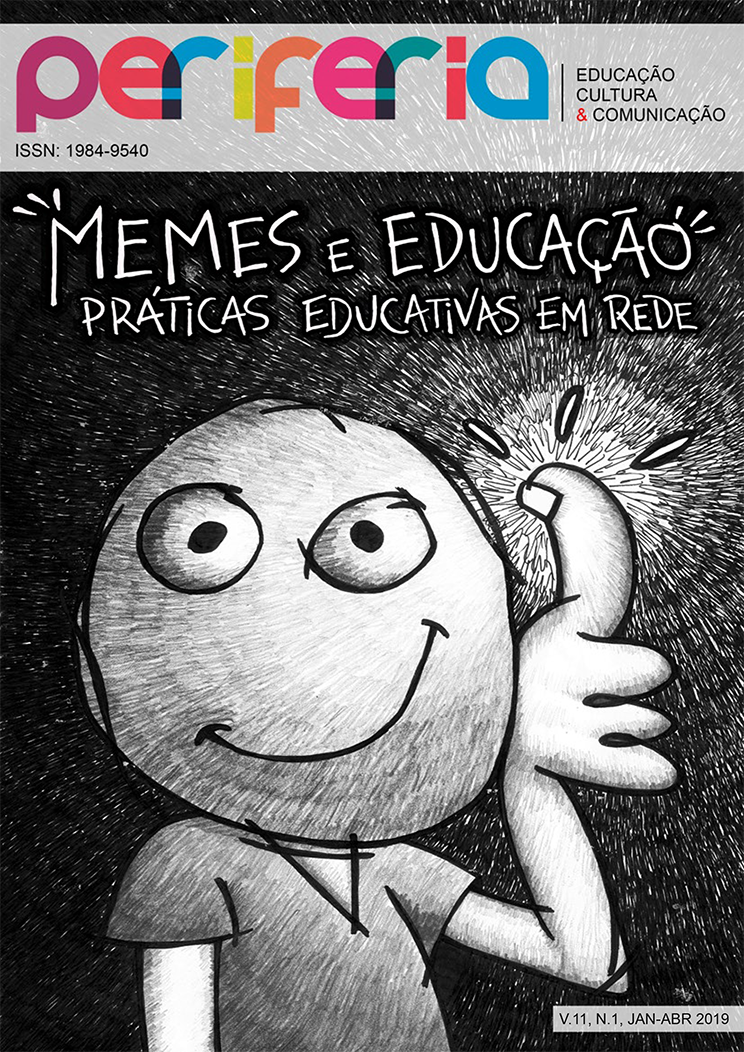MEMES NO APRENDIZADO DE LÍNGUAS: UMA PRÁTICA MULTILETRADA NA FORMAÇÃO DOCENTE PARA A JUSTIÇA SOCIAL
DOI:
https://doi.org/10.12957/periferia.2019.39390Palavras-chave:
aprendizado de línguas, multiletramentos, memesResumo
A opção argumentativa deste artigo surge das discussões sobre práticas pedagógicas de professores de línguas adicionais do grupo de pesquisa EAL - Ensino e Aprendizagem de Línguas: abordagens, metodologias e tecnologias (CNPq/UERJ) e reiteradas em leituras e estudos da disciplina de pós-graduação Processos de compreensão na era digital: a oralidade e a escrita. O foco da discussão é a crença de que a formação docente na contemporaneidade não deva ser vista como prescrição, mas como reflexão e atendimento das singularidades dos contextos educacionais de forma crítica. Sendo assim, o texto materializa o ensejo por discutir, atualizar e aproximar o conceito de multiletramentos à formação de professores. Para tanto, o texto é apresentado em quatro partes: considerações iniciais, que apresenta brevemente o conceito de multiletramentos; uma discussão sobre a formação docente, que busca a justiça social; um exemplo de aplicação de memes para o processo de ensino-aprendizagem de espanhol e finalmente, o texto é concluído com algumas considerações finais.Downloads
Publicado
08.02.2019
Como Citar
Cardoso, J. da S., Alcântara, A. C. B., & Matta, A. B. S. da. (2019). MEMES NO APRENDIZADO DE LÍNGUAS: UMA PRÁTICA MULTILETRADA NA FORMAÇÃO DOCENTE PARA A JUSTIÇA SOCIAL. Periferia, 11(1), 54–72. https://doi.org/10.12957/periferia.2019.39390
Edição
Seção
Número Temático
Licença
Autores que publicam nesta revista concordam com os seguintes termos:- Autores mantém os direitos autorais e concedem à revista o direito de primeira publicação, com o trabalho simultaneamente licenciado sob a Creative Commons Attribution License que permitindo o compartilhamento do trabalho com reconhecimento da autoria do trabalho e publicação inicial nesta revista.
- Autores têm autorização para assumir contratos adicionais separadamente, para distribuição não-exclusiva da versão do trabalho publicada nesta revista (ex.: publicar em repositório institucional ou como capítulo de livro), com reconhecimento de autoria e publicação inicial nesta revista.
- Autores têm permissão e são estimulados a publicar e distribuir seu trabalho online (ex.: em repositórios institucionais ou na sua página pessoal) a qualquer ponto antes ou durante o processo editorial, já que isso pode gerar alterações produtivas, bem como aumentar o impacto e a citação do trabalho publicado (Veja O Efeito do Acesso Livre).







